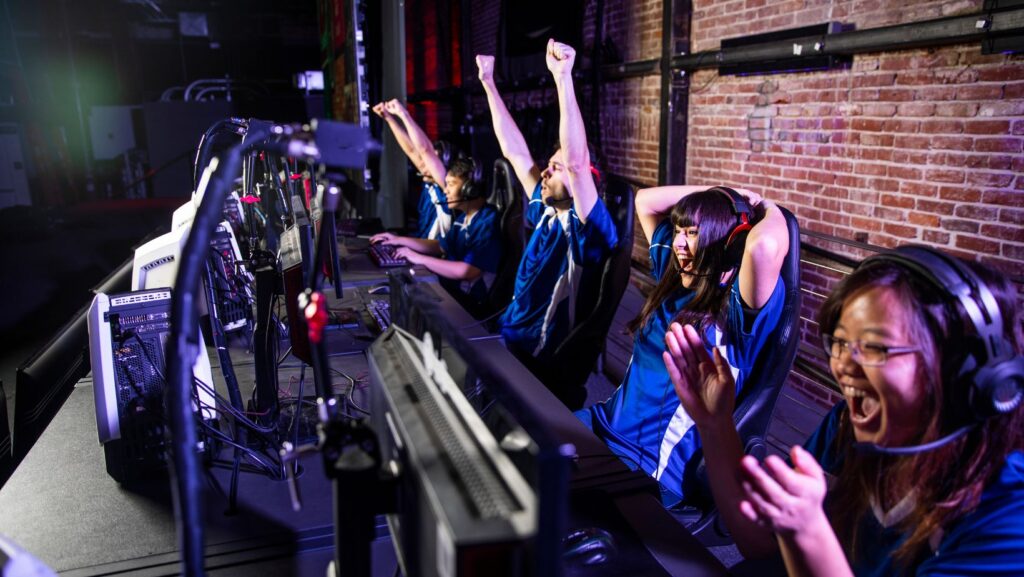
Approximating the number of active sports played around the world is nearly impossible. As technology progresses the world of sport has also advanced. Once confined to physical arenas or stadiums, sports have expanded into the digital world.
Today sports blend traditional games with interactive and virtual experiences. The shift is reflected in fan engagement through esports, fantasy leagues and virtual reality (VR) platforms. With these technologies fans have better engagement with their favorite teams and athletes.
In this blog post, we will explore how internet gaming is reshaping the world of sports for businesses and fans.
The integration of esports and traditional sports
Once considered a niche interest, the rise of esports has been nothing short of remarkable. Now, esports are a global phenomenon. It’s so big that tournaments featuring games such as League of Legends are rivaling traditional sports in terms of viewership numbers. Aside from the large number of spectators, it has attracted billions in sponsorships and has gathered major media attention.
Seeing how mainstream esports have become, traditional sports leagues are beginning to transition to the digital shift. An example is the NBA 2K League, which has brought the basketball experience to the virtual world. Other organizations such as FIFA and Formula One have also launched their own esports tournaments merging gaming and physical sports.
The esports market is projected to reach a revenue of $4.3bn by the end of 2024, representing an annual growth rate of 6.59%. As esports grow in revenue the lines between physical and virtual competitions are expected to merge. Why? Major corporations that own sports teams see this as an opportunity to expand their businesses and earn more – hence a merger between esports and traditional sports.
Sometimes, there are crossovers from traditional sports to esports tournaments. Professional athletes themselves are becoming active participants in the gaming community. An example is Spanish football player David de Gea, who created Rebels Gaming. The crossover is creating a hybrid sports culture in which traditional and digital formats complement each other.
Enhanced fan engagement through interactive platforms
The technology of online games simulates real-world gameplay which makes games feel more interactive. Let’s take games like EA FC (formerly known as FIFA) and Madden as examples. These games feature real-life teams, players, stadiums and competitions. Fans who play these games feel more connected to their favorite sport as they get to control their favorite teams and athletes.
Another form of fan interaction that the internet has driven is fantasy sports. By building virtual teams with real player proxies, fans develop a stronger attachment to the sport. Fantasy sports have impacted match viewership positively as fans watch to note the statistical performances of their players. Fantasy sports are highly competitive as there are global and mini leagues among friends.
Other interactive platforms that have developed the gamification of sports are prediction games and reward systems. By predicting the correct scores of games throughout the season players are awarded points. Whoever accumulates the most points at the end of the season is crowned champion. In order to win the prediction contest, fans track stats and gather enough information.
Virtual experiences are further amplified during live sports events. Fans can engage in real-time through social media, live streams and virtual reality. In short, online platforms are making sports consumption an active participatory experience, beyond just watching.
New revenue streams for sports organizations
Several sports are multibillion-dollar industries, generating money from ticket sales, merchandise and other ventures. Corporations that own a stake or sponsor teams in sporting events, leagues and competitions are always looking for ways to grow their earnings. That said, online gaming has introduced new business models diversifying their revenue streams.
Partnerships with giants in the games development sector have been key to these new streams. Let’s take EA Sports, for example. This video game brand has partnered with FIFA in the past to create yearly football games. By licensing their brand and players, FIFA was able to capitalize on a global gaming audience.
Monetization goes beyond selling gaming rights. These sports organizations can also generate funds from esports tournaments, in-game purchases and fan-centric platforms. Organized virtual competitions attract viewership and sponsorships while in-game purchases such as custom features add income. Fan-driven platforms also encourage microtransactions as they offer rewards and exclusive content.
Aside from organizations, individual athletes can also benefit from engagements in iGaming. The financial opportunity mostly comes from sponsorships and endorsements. For example, athletes could sign deals with companies to stream gameplay or feature in promotional content. This helps them expand their brand and serves as an extra source of income.
The future of sports: virtual reality and augmented reality in online gaming
Sports and online games have come a long way. As new automated technologies are shaping the world, we can expect them to also influence sports. Many experts in online casino games including Harper Gallagher, anticipate that virtual reality (VR) and augmented reality (AR) are the next phase for the sports gaming industry.
By creating a digital environment, these technologies enhance fans’ interactions and experience. Virtual reality (VR) serves as a gateway to virtual sports experiences. By using this technology, fans can play simulated games and virtually attend live sports events. This way players do not have to be physically present to experience the sensation of being in the stands while enjoying the match.
On the other hand, augmented reality (AR) is applied to offer real-time stats. This includes player data, team news and interactive graphics in live broadcasts or apps. Fans can therefore follow games as they unveil them as they have live updates overlaid on their screen. Even those who have little to no experience or interest can gain insight into sports with AR.
As VR and AR progress, sports and gaming will merge more extensively. Future trends suggest further integration of these technologies in fan engagement, pushing the limits of how we experience sports.













